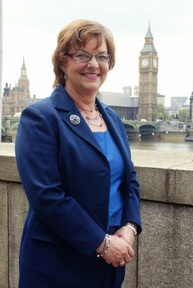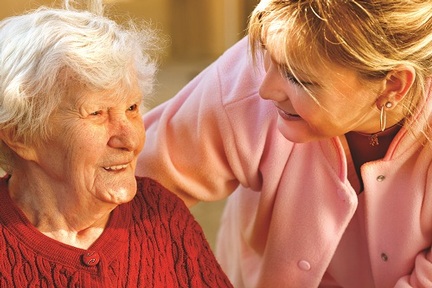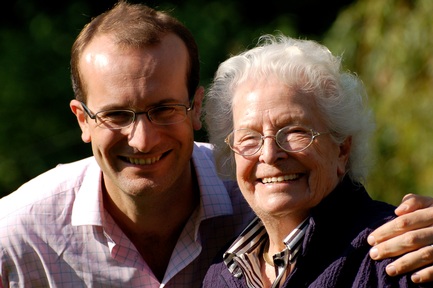Profile: Home care chief Bridget Warr keeps home care on top of Government agenda
Home care hit the headlines this year, causing consternation with the news that many home visits now last barely 15 minutes.

Various ministers, MPs and charities were quick to condemn the short visit times saying it was putting the health and welfare of older people at risk.
It was a major coup for the which managed to make home care visits such a high profile issue, through the survey it had carried out.
It is thought it was this survey which led to the Government raising the issue of short home visits in the Care and Support White Paper.
Bridget Warr, chief executive of the United Kingdom Homecare Association, says: “We have been working hard on our campaigning and we are very clear on the need for hard evidence to back up our arguments.
We have been carrying out surveys and reports that have made local authorities, Government and the media sit up and listen.”
Mrs Warr joined the UKHCA, which represents a third of home care providers in the UK, two years ago.
She says: “What gives me the greatest joy is building on the work of organisations that takes them to an even higher level of effectiveness. During my two years at the UKHCA I think I have managed to clarify its vision and strategy and I believe I did the same when I was at the Guide Dogs Association. At UKHCA I have been working to bring members closer to the organisation.”
Mrs Warr is a registered social worker and says her “entire career has been around trying to change the environment for people who live with disadvantage”.
“Home care is very much an area where we can promote independence for people who want to live in their own home. I am hugely optimistic for the future of our sector. Times are very tough at the moment due to the economic situation we are living in – home care organisations that are contracted to local authorities are going through a very tough time.
“We have disturbing evidence of the trend for people to be left on their own and receiving 15 or 30 minutes for really intimate care, due to the limited amount of money local authorities have available to pay for services they are obliged to provide. We have to raise the profile of this and the importance of home care for people who want to stay at home. It worries me that society allows people in this state to be so low down the priority list. It appears not to matter very much that they are receiving very short visits from a workforce which is under-rewarded for the vital work they do.
“Home care visits have been trimmed and now many local authorities are only offering personal care. Before people would have had help with their finances, cooking and shopping. These things are being cut because of constrained public spending, yet it is these things that can make the difference and helps people remain as part of their existing community.”

The UKHCA’s survey earlier this year showed 73 per cent of visits commissioned by local councils are of 30 minutes or fewer and often these visits are to carry out personal care.
“A home care worker recently asked me how she could provide safe and dignified care in such little time. There are no home care workers who want to give care that is rushed or which means they leave the house knowing that urgent needs have not been met,” says Mrs Warr.
She is delighted the “Government has included tackling the use of short visits in the Care and Support White Paper” and says: “It must be a priority. People who pay for their own care never ask for a 15 minute visit for personal care: those whose care is paid for by the state should not receive them either.”
Mrs Warr would like to see health and social care working more closely together as she believes “there are efficiencies that could be made. We have seen some local authorities moving away from very restrictive 15 minute visits and moving towards caring for a person who needs support”.
“Home care providers need to look at what the local authorities are offering in terms of money and look at how they can spend the money most effectively. People who use home care may prefer fewer, longer visits that really improve their quality of life and increase social interaction.”
Personal budgets were introduced into England in 2008, and were designed to allow people in need of care and support, to have more control over their care provision.
However the take up of personal budgets by older people has been much lower than younger adults with many concerned about the complexities of managing a budget.
Mrs Warr says: “If personal budgets are allocated in the right way, I believe they can work. If local authorities say ‘here is the money, spend it on what will really make a difference’ then the individual can buy the service they need in the way they want. The problem seems to be that some local authorities have real difficulty in letting go of control.”
She sees the demand for home care growing and says: “The elderly population is going to grow dramatically and many of them will want to stay in their own home so there is going to be an enormous demand and we need a rich and diverse market that is able to cope with a massive growth in people funding their own care or supported by the state.” She believes it is vital that the Government sort out how care is funded in the long term as “failing to pay for good quality home care will add to a continuing growth in unplanned hospital admissions and residential care”.

“The recommendations from the Dilnot Commission are not perfect but implementing his proposals would be a big step forward. It is a very good and sensible state of recommendations and I sincerely hope the Government will implement them. As well as the cap, he says insurance products should be offered to people and I think that is a good idea. It is naïve to think all social care will be funded by the state.”
In terms of qualifications for care workers, Mrs Warr thinks “it would be good for care workers to have a guaranteed level of competence”.
She says: “Care workers need to bring the right attitude, personality and character to the job, but providers have to make sure they also train them so they have the right skills. There should also be a better range of options for care workers to develop specialisms in dementia care or end of life care and these should be nationally accredited.”
Mrs Warr’s plan for the future is to continue campaigning on behalf of home care providers and ensuring “home care is of the highest quality”.
“We are pushing the Government and local authorities to make them realise the risks of current commissioning trends. We want to highlight good practice and get people to adopt good practice. We want to hear from home care providers who are doing innovative things and from local authorities who are moving towards commissioning for positive outcomes rather than just a list of tasks to be performed in a limited time.”
Interesting facts
What was your first job: Teaching in the West Indies in a girls’ school
What is your favourite book: The Sun in the Morning by Mary Margaret Kaye
What is your favourite film: The Best Exotic Marigold Hotel
What is your favourite piece of music: Jazz Suite by Dmitri Shostakovich
What is the best present you have received: My first bicycle
What was your last holiday: A cruise on the Norwegian coast to see the Northern Lights
Latest Profiles News
 01-Aug-19
Deal or No deal: Boris Johnson must protect care workforce says home care chief
01-Aug-19
Deal or No deal: Boris Johnson must protect care workforce says home care chief
 04-Dec-15
Former John Lewis director reveals why his home care company is employee owned
04-Dec-15
Former John Lewis director reveals why his home care company is employee owned
 17-Jul-15
Being a home care worker gives you the opportunity 'to make a real difference to someone’s life'
17-Jul-15
Being a home care worker gives you the opportunity 'to make a real difference to someone’s life'
 04-Mar-15
Home Instead boss calls for 'radical change' saying social care and health must be integrated
04-Mar-15
Home Instead boss calls for 'radical change' saying social care and health must be integrated
 02-Dec-14
Profile: ‘We do not do 15-minute visits’ says managing director of Right at Home
02-Dec-14
Profile: ‘We do not do 15-minute visits’ says managing director of Right at Home